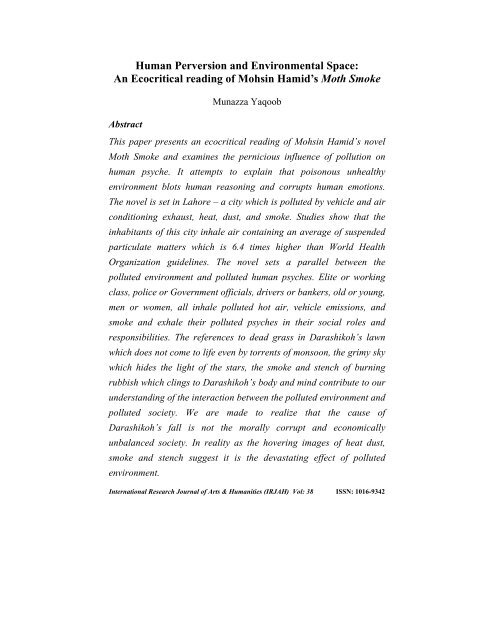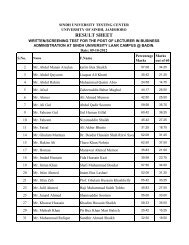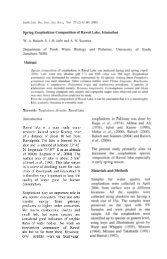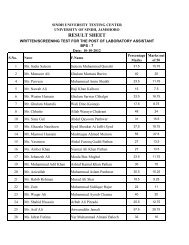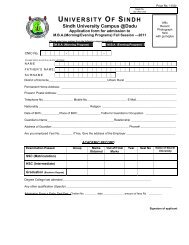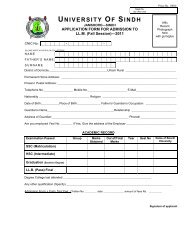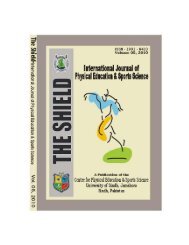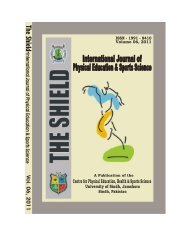An Ecocritical - University of Sindh
An Ecocritical - University of Sindh
An Ecocritical - University of Sindh
Create successful ePaper yourself
Turn your PDF publications into a flip-book with our unique Google optimized e-Paper software.
Human Perversion and Environmental Space: <strong>An</strong> <strong>Ecocritical</strong> study <strong>of</strong> Mohsin Hamid’s<br />
Human Perversion and Environmental Space:<br />
<strong>An</strong> <strong>Ecocritical</strong> reading <strong>of</strong> Mohsin Hamid’s Moth Smoke<br />
Abstract<br />
Munazza Yaqoob<br />
This paper presents an ecocritical reading <strong>of</strong> Mohsin Hamid’s novel<br />
Moth Smoke and examines the pernicious influence <strong>of</strong> pollution on<br />
human psyche. It attempts to explain that poisonous unhealthy<br />
environment blots human reasoning and corrupts human emotions.<br />
The novel is set in Lahore – a city which is polluted by vehicle and air<br />
conditioning exhaust, heat, dust, and smoke. Studies show that the<br />
inhabitants <strong>of</strong> this city inhale air containing an average <strong>of</strong> suspended<br />
particulate matters which is 6.4 times higher than World Health<br />
Organization guidelines. The novel sets a parallel between the<br />
polluted environment and polluted human psyches. Elite or working<br />
class, police or Government <strong>of</strong>ficials, drivers or bankers, old or young,<br />
men or women, all inhale polluted hot air, vehicle emissions, and<br />
smoke and exhale their polluted psyches in their social roles and<br />
responsibilities. The references to dead grass in Darashikoh’s lawn<br />
which does not come to life even by torrents <strong>of</strong> monsoon, the grimy sky<br />
which hides the light <strong>of</strong> the stars, the smoke and stench <strong>of</strong> burning<br />
rubbish which clings to Darashikoh’s body and mind contribute to our<br />
understanding <strong>of</strong> the interaction between the polluted environment and<br />
polluted society. We are made to realize that the cause <strong>of</strong><br />
Darashikoh’s fall is not the morally corrupt and economically<br />
unbalanced society. In reality as the hovering images <strong>of</strong> heat dust,<br />
smoke and stench suggest it is the devastating effect <strong>of</strong> polluted<br />
environment.<br />
International Research Journal <strong>of</strong> Arts & Humanities (IRJAH) Vol: 38 ISSN: 1016-9342<br />
93
94<br />
Human Perversion and Environmental Space: <strong>An</strong> <strong>Ecocritical</strong> study <strong>of</strong> Mohsin Hamid’s<br />
This Marxian ecocritical interpretation <strong>of</strong> Moth Smoke is based on “the<br />
realization that individuals and social pathologies are<br />
coextensive” (Buell 2000:289). The novel with a deep ecological<br />
concern shows a reaction to the environmental pollution and “spiritual<br />
deficiencies <strong>of</strong> urban space” (Rozelle 2002:101). Regarding human<br />
life inseparable from the environment, the novel supports Buell’s<br />
opinion that physical environment influences human imagination and<br />
cognition (1986:283). It considers human society and nature as<br />
interconnected and interdependent and discusses how human identities<br />
are shaped by the biosphere they live in. The author through the<br />
portrayal <strong>of</strong> a socially, emotionally, and psychologically sick people<br />
living in a sick environment has skillfully made the external internal<br />
and internal external.<br />
Lahore, where the story is set, seems a symbol <strong>of</strong> apocalypse<br />
where life is fluttering in the cage <strong>of</strong> spiritual and emotional as well as<br />
social death. It is a place where people lack the glory and sublimity <strong>of</strong><br />
human imagination and soul. They are isolated whether they are in<br />
large social gatherings, air-conditioned rooms or airless dark rooms. A<br />
silence occupies their souls even when they are busy in social<br />
interaction or expressing love or making business deals. They are cold<br />
from inside whether they are making love, communicating with friends<br />
or socializing. Being alone, silent and cold signifies spiritual death.<br />
They are like decaying corpses and stench clings with them. Daru, the<br />
protagonist admits, “the smell stays with me….It clings even after I<br />
shower. Even after I dump my clothes in a tub <strong>of</strong> soapy water. It clings<br />
to me” (Hamid 2000:216). They desperately attempt to stave <strong>of</strong>f their<br />
spiritual and emotional death and regenerate their human selves<br />
through drugs, sex, and other material luxuries but to no avail. It is a<br />
International Research Journal <strong>of</strong> Arts & Humanities (IRJAH) Vol: 38 ISSN: 1016-9342
Human Perversion and Environmental Space: <strong>An</strong> <strong>Ecocritical</strong> study <strong>of</strong> Mohsin Hamid’s<br />
story <strong>of</strong> people who are like the wastelanders in Eliot’s The Waste<br />
Land. They are struggling to enjoy the bliss <strong>of</strong> love and to attain<br />
contentment in family life but fall prey to sex which ends merely in<br />
exhaustion, sickness and discontentment.<br />
The environment related studies on Lahore, as for example an<br />
ambient air quality study carried out by Pakistan Environmental<br />
Agency and Japan International Cooperation Agency, show that the<br />
average suspended particulate matter in Pakistan’s big cities like<br />
Lahore, Rawalpindi, and Islamabad is 6.4 times higher than World<br />
Health Organization (WHO) guidelines and average vehicle emission<br />
is 15-20 times more than the average vehicle emission in developed<br />
country (Abedullah 2006:3135). As a result <strong>of</strong> air pollution about<br />
1,250 people die each year in Lahore and a large number are suffering<br />
from serious health hazards especially diseases related to eyes,<br />
respiratory system, heart, skin, and brain (Ali 2006). We do not find<br />
any reference in the novel that any group <strong>of</strong> people whether rich or<br />
poor is concerned with the decay <strong>of</strong> nature around them or the<br />
ecosystem they are living in. There is no reference to any<br />
establishment to investigate environment related issues. There is no<br />
attempt on the part <strong>of</strong> people or government to create awareness about<br />
the damage people are causing to environment and are becoming the<br />
victims <strong>of</strong> this damaged ecosystem. The attitude <strong>of</strong> the people depicted<br />
in the novel is supported by Abedullah who reports that “a number <strong>of</strong><br />
environment related laws…. Through Pakistan Environment<br />
Protection ordinance 1983 exist. However, these laws are not<br />
implemented fully and effectively (2006:3137).<br />
As the narrative moves on the readers can not escape the<br />
hovering images <strong>of</strong> dust, smoke, stench and heat. The atmosphere<br />
International Research Journal <strong>of</strong> Arts & Humanities (IRJAH) Vol: 38 ISSN: 1016-9342<br />
95
96<br />
Human Perversion and Environmental Space: <strong>An</strong> <strong>Ecocritical</strong> study <strong>of</strong> Mohsin Hamid’s<br />
remains grim through out whether the scenes are set in lawn parties,<br />
air-conditioned rooms, workshops or streets. We are informed by<br />
Hamid (2000) in the novel that people are being baked in heat (11),<br />
sweat and heat are “radiating out” <strong>of</strong> their bodies (85), they are “damp<br />
and smelly” (40), and their faces are floating in the “great womb <strong>of</strong><br />
drug” (217). We are also told that “there are no stars because <strong>of</strong> the<br />
dust” (16). Everything is “dulled by a layer <strong>of</strong> dust” (95), and “the sun<br />
is completely blotted out by a dirty sky” (99). Our attention is also<br />
drawn to “mounds <strong>of</strong> rubbish in front <strong>of</strong> the neighbors’ houses<br />
smolder, trash smoke rising only to be beaten down by the rain” (216).<br />
Due to absence <strong>of</strong> a proper sewerage system “dirty water stretches<br />
across the road.” (230), and there is “smoky breeze that stinks <strong>of</strong><br />
burning flesh from the trash pile down the street.” (231). Daru, the<br />
protagonist <strong>of</strong> the novel also tells us that when it rains he can “smell<br />
the dead grass that lies under the dirt <strong>of</strong> the lawn” (205) and that the<br />
rain does not regenerate nature and people rather brings flooding<br />
which brings “a crime wave to Lahore” (206). The city <strong>of</strong> Lahore, he<br />
tells us, is a “soggy city” (206). Recurring images <strong>of</strong> dust, smoke and<br />
heat and lack <strong>of</strong> brightness and freshness present the readers a world<br />
which is stale and tired where all human affairs and actions seem an<br />
endless pettiness.<br />
The novel presents a society where a division has occurred<br />
between man and environment. It is a society where according to<br />
Wolanski the dynamic balance between culture and nature that<br />
determines physical and psychological health, has been disturbed<br />
(1999:79). Hence people are neither physically sound nor<br />
psychologically and spiritually happy. They lack a sound political and<br />
social consciousness, are culturally sick and economically deficient.<br />
International Research Journal <strong>of</strong> Arts & Humanities (IRJAH) Vol: 38 ISSN: 1016-9342
Human Perversion and Environmental Space: <strong>An</strong> <strong>Ecocritical</strong> study <strong>of</strong> Mohsin Hamid’s<br />
They are unhealthy and it makes them unhappy as well because “being<br />
happy means being physically sound, mentally intact, spiritually<br />
happy, socially active, politically aware, economically productive and<br />
culturally responsible” (Honari, 1999:19). Daru has been portrayed as<br />
a smart young man who degenerates into a drug addict. His sunken<br />
cheeks and lean body speak <strong>of</strong> his bad health. Murad a graduate with a<br />
master’s degree in English literature is what Null and Alfred term as<br />
“scatological” with a stinking sweating lumpy body with layers <strong>of</strong> fat<br />
on it (2003:1). The bureaucracy represented by Ozi’s father and Ozi<br />
and the middle classes represented by Daru and Murad are not<br />
contributing to the economy. They are culturally sick and are making<br />
their own wealth by robbing other people and their own country.<br />
The novel advocating the necessity to acknowledge the<br />
significance <strong>of</strong> a healthy ecosystem for a healthy individual and social<br />
life draws our attention to the factors responsible for this deadly<br />
division between man and environment. The author seems to criticize<br />
the brutality <strong>of</strong> the capitalist system. In this system as the novel shows<br />
us, “whatever a man gains, he gains at the expense <strong>of</strong> some other<br />
man’s loss” (Morris 2000:32). The novel challenges the logic <strong>of</strong><br />
capital economy and industry which insists that nothing matters<br />
beyond money, capital, and commodities. It supports Lenin’s opinion<br />
as cited by Eyerman that the capitalist system producing “a short range<br />
and pragmatic view” in people pushes them to a strain <strong>of</strong> labour for<br />
getting more and more (1981:45). Lahore in the novel represents<br />
Pakistan, which in the author’s view is a disillusioned capitalist<br />
society. In this capitalist society the author shows us the irrational<br />
categorization <strong>of</strong> humans into classes based on wealth. Those who are<br />
born rich enjoy all the material comforts and social respect and have<br />
International Research Journal <strong>of</strong> Arts & Humanities (IRJAH) Vol: 38 ISSN: 1016-9342<br />
97
98<br />
Human Perversion and Environmental Space: <strong>An</strong> <strong>Ecocritical</strong> study <strong>of</strong> Mohsin Hamid’s<br />
an enormous power <strong>of</strong> purchase. Their pride and power lead them to<br />
the actions which are destructive but are duly justified or concealed by<br />
the system they are operating within. Their destructive actions include<br />
money laundering, murdering, drug addiction, alcohol addiction,<br />
adultery, exploitation <strong>of</strong> lower classes etc. Those who are placed in the<br />
lower order in this economical hierarchy are relegated to sub human<br />
status. Being deprived <strong>of</strong> the privileges the rich enjoy, the comforts<br />
and luxuries and power <strong>of</strong> purchase, they look at the rich with envy<br />
and revenge. Their envy, desire for wealth, and revenge also lead them<br />
to destructive actions such as murder, drug addiction, drug dealing,<br />
adultery, robbery, etc., but unlike the rich they are punished by the law<br />
and society for their crimes. The tragic end <strong>of</strong> Darashikoh draws our<br />
attention to this dark aspect <strong>of</strong> the society depicted in the novel.<br />
People in Lahore do not live their life in alliance with nature.<br />
Rather they live as commodities in industrial capital society. This<br />
irrational establishment <strong>of</strong> identities engages people in a blind struggle<br />
to accumulate wealth, capital, material luxuries forgetting that they are<br />
humans blessed with a soul and a human heart. Spiritual satisfaction,<br />
emotional purification and intellectual sophistication are irrelevant<br />
issues and alien phenomenon to people living as commodities.<br />
Accumulation <strong>of</strong> wealth for acquiring power <strong>of</strong> purchase becomes the<br />
logic for living a good life for the people whose identities are<br />
associated with capital rather than with human values. One <strong>of</strong> the<br />
significant examples in this regard is the character <strong>of</strong> Ozi. He is the<br />
only son <strong>of</strong> a corrupt bureaucrat and represents the extravagance <strong>of</strong> the<br />
consumer culture. For Hamid (2000) he “more than most men, sought<br />
to master his environment” (105). He loves air-conditioners with “a<br />
passion unrivaled by his love for any other species <strong>of</strong> inanimate<br />
International Research Journal <strong>of</strong> Arts & Humanities (IRJAH) Vol: 38 ISSN: 1016-9342
Human Perversion and Environmental Space: <strong>An</strong> <strong>Ecocritical</strong> study <strong>of</strong> Mohsin Hamid’s<br />
object” (105) and the novel subtly suggests that he loves it more than<br />
humans as he prefers to have air-conditioning to being with his wife in<br />
his room. Air-conditioner in the novel becomes a symbol <strong>of</strong> material<br />
luxuries, enormous power <strong>of</strong> purchase, and industrial commodities<br />
which is the birth right <strong>of</strong> those who are born in rich families. He has<br />
all that a capitalist society considers necessary to make life happy and<br />
healthy: big cars, grand mansion, good education, elitist parties, a<br />
beautiful life and a son. The novel also tells us about Ozi that loves<br />
driving fast which leads to the accident in which he hits a boy and kills<br />
him but does not feel any remorse. He is not comfortable in his family<br />
life so tries to seek satisfaction in extravagant parties. These details<br />
help the readers to probe in the deep recesses <strong>of</strong> his psyche to discover<br />
that it is chaotic and disordered. All these speak <strong>of</strong> a man who is<br />
spiritually hollow and psychologically dissatisfied. He appears to be a<br />
man with distorted cognition and psyche and is desperately trying to<br />
seek health and happiness in wealth and material luxuries. Ozi’s life<br />
style represents Lahore’s elite culture which has ignored the balance<br />
between culture and environment. The novelist thus helps the reader to<br />
see how when a culture disregards nature it becomes the cause <strong>of</strong> the<br />
decay not only <strong>of</strong> the ecosystem but the whole society as well.<br />
Man in the novel is shown as an active agent and responsible<br />
for environmental pollution and also a victim <strong>of</strong> it. Rich and poor, both<br />
being spiritually barren and emotionally rotten are like “shadows” and<br />
“like stain dissolve into grayness” (5). They are suffering from<br />
distorted cognition and sick psyches. They are subjects constructed<br />
through a process <strong>of</strong> conditioning by the capitalist ideology (Althusser:<br />
1971). For Hawkes “This process <strong>of</strong> conditioning is manipulation <strong>of</strong><br />
the soul”, which, “is just as necessary for the functioning <strong>of</strong> today’s<br />
International Research Journal <strong>of</strong> Arts & Humanities (IRJAH) Vol: 38 ISSN: 1016-9342<br />
99
100<br />
Human Perversion and Environmental Space: <strong>An</strong> <strong>Ecocritical</strong> study <strong>of</strong> Mohsin Hamid’s<br />
economy as the disciplining and regimentation <strong>of</strong> the body was to the<br />
capitalism <strong>of</strong> the industrial epoch” (2003:164). The people <strong>of</strong> Lahore<br />
are presented as conditioned subjects who have lost their “rational<br />
autonomy”, i.e., in the words <strong>of</strong> Warren, “the ability to reflect on and<br />
direct [their] desire in a way that [they] can develop life<br />
plan” (1990:615). They believe that immediate satisfaction <strong>of</strong> their<br />
desires for material comforts and commodities is what a man needs in<br />
life and should work for it. This distorted cognitive functioning serves<br />
as motivation for all <strong>of</strong> their actions which disregard human values.<br />
People, being under this false consciousness, view all their actions and<br />
the actions <strong>of</strong> others which are <strong>of</strong> the interests <strong>of</strong> capitalists as normal.<br />
They support individualism, are engaged in commodity worship, and<br />
do not value social totality (Eyerman 1981:50). The market for them<br />
becomes the law to regulate social and individual life. Individuals in<br />
such a system turn a deaf ear to the voice which invites them attempts<br />
to break their false conscious and help them see the brutal reality <strong>of</strong><br />
the system. One <strong>of</strong> Daru’s old school fellow who is fighting against<br />
those who have “control over [their] destinies” (Hamid 2000: 225)<br />
tells him that they “need a system ….where man can rely on the law<br />
for justice, where he is given basic dignity as a human being and<br />
opportunity to prosper regardless <strong>of</strong> his status at birth.” (225). He<br />
invites Daru to join their movement for socioeconomic reformation,<br />
but Daru rejects the invitation and in the end we see that he becomes<br />
the victim <strong>of</strong> the corrupt system.<br />
The world portrayed in the novel is a complex world <strong>of</strong><br />
geopolitical, socioeconomics, and ecosocial issues. Informing the<br />
readers that the people <strong>of</strong> Lahore are “at the mercy <strong>of</strong> the<br />
powerful” (225), Hamid builds up a significant link between atomic<br />
International Research Journal <strong>of</strong> Arts & Humanities (IRJAH) Vol: 38 ISSN: 1016-9342
Human Perversion and Environmental Space: <strong>An</strong> <strong>Ecocritical</strong> study <strong>of</strong> Mohsin Hamid’s<br />
bomb testing and the economic and environmental crisis <strong>of</strong> the<br />
country. References to unusual heat wave which is causing death and<br />
disease and to wretched economic conditions <strong>of</strong> the people are placed<br />
parallel to the references to the celebrations on the successful testing<br />
<strong>of</strong> the bomb. This helps the author to facilitate the readers to<br />
understand his critical views on the ideological conditioning <strong>of</strong> people<br />
in a capitalist society.<br />
Inhabitants <strong>of</strong> Lahore as discussed are portrayed as subjects<br />
conditioned by capitalistic hegemonic powers, so they live with false<br />
conscious, are suffering from distorted cognition, and have lost their<br />
‘rational autonomy’. These are the power structures <strong>of</strong> the society,<br />
Hamid attempts to show, which influence people’s attitude towards the<br />
environment (Bukeavich 2002:54). Hence it is not strange if they show<br />
a total disregard for biosphere and the living world <strong>of</strong> nature around<br />
them. It is also not strange if they are totally ignorant <strong>of</strong> the damage<br />
being done to them – to their body, soul, and psyche by their polluted<br />
environment. They are sick in heart, in personal life, in family life and<br />
in their social life. Mumtaz, though married, seeks satisfaction in<br />
having sexual relations with her husband’s best friend. Ozi finds<br />
satisfaction in sleeping naked in an extremely warm bedroom in winter<br />
and sleeping with a blanket in an extremely cold bedroom in summer<br />
and even prefers air- conditioning to being with his wife. Daru idles<br />
away his days in taking drugs and killing moths and enjoying sex with<br />
his best friend’s wife, and Murad seeks happiness in intimidating<br />
people, robbing them, cheating them, and selling drugs. Police,<br />
bureaucracy, and bankers all are shown corrupt.<br />
The novel makes it clear that a social system which is erected<br />
on the power <strong>of</strong> capital and luxury industry breeds consumer culture<br />
International Research Journal <strong>of</strong> Arts & Humanities (IRJAH) Vol: 38 ISSN: 1016-9342<br />
101
102<br />
Human Perversion and Environmental Space: <strong>An</strong> <strong>Ecocritical</strong> study <strong>of</strong> Mohsin Hamid’s<br />
marked by snobbery, pride, and artificiality, has no concern for nature<br />
and for environment. Such a system taking man as separate from the<br />
nature becomes one <strong>of</strong> the major cause <strong>of</strong> environmental abuse (Luke,<br />
1997:5). The references to the smoky breeze, dull sky, and rotten food<br />
and fruit emphasize disharmony which has occurred between man and<br />
nature. The author seems to take gardening as a “careful management<br />
<strong>of</strong> nature” (Kehler 2007:617). He refers to Daru’s neglected lawn with<br />
dried grass coated with dust in order to present the sorry picture <strong>of</strong> the<br />
relationship between man and nature. The novel shows us that the<br />
polluted environment has affected human mind, body and psyche. The<br />
disharmony which has occurred between man and nature, the novel<br />
explains, is not only causing damage to nature but man’s health and<br />
happiness.<br />
The author thinks that the people <strong>of</strong> Lahore are living in<br />
polluted environment and are “committing slow suicide” (Luke<br />
1997:9). The description <strong>of</strong> polluted places, rotten food, and dirty<br />
smelly human bodies all speak <strong>of</strong> rotten space. The protagonist Daru<br />
keeps sweating, his home is filthy, stinking, smoky and dark, his<br />
garden is dead and dry, his room is airless and dark, the food in his<br />
house is “consumed by colored molds that spread like cancer” (211),<br />
the rotten fruit oozes out <strong>of</strong> “ruptures in sickly skin” (211). The author<br />
has thus meaningfully set Daru’s physical sickness, emotional<br />
morbidity and drug addiction, parallel to his sick body and filthy space<br />
he is living in.<br />
The novel gives us an understanding that environmental space<br />
and the humans who live in it are inseparable (Bates 2000:257). People<br />
in the novel are shown as agents as well as victim <strong>of</strong> the rotten<br />
socioeconomic and ecological system. The novel helps us to<br />
International Research Journal <strong>of</strong> Arts & Humanities (IRJAH) Vol: 38 ISSN: 1016-9342
Human Perversion and Environmental Space: <strong>An</strong> <strong>Ecocritical</strong> study <strong>of</strong> Mohsin Hamid’s<br />
understand society through nature and nature through society. It is a<br />
morality tale which gives a lesson that a happy healthy society<br />
“emerges from the kindred relationship <strong>of</strong> humanity with natural<br />
world” and the space, which man perverts, in turn damages his<br />
physical health and perverts his psyche (Mayers 2003:18).<br />
References<br />
Abedullah. (2006). Sources and consequences <strong>of</strong> environmental pollution<br />
and institution’s role, in Pakistan. Journal <strong>of</strong> Applied Sciences 6 (15), 3134-<br />
3139.<br />
Ali, N. (2006, 26 January). Commuter transport poisoning Lahore. Daily<br />
Times. Retrieved from http://www.dailytimes.com.pk<br />
Althusser, L. (1971). Lenin and Philosophy and other Essays. (B. Brewster,<br />
Trans.). London: New Left Books. (Original work published 1969).<br />
Bates, J. (2000). The Ode ‘to Autumn’ as Ecosystem. In L. Coupe (Ed.),<br />
Green studies reader: From romanticism to ecocriticism (256-261).<br />
Florence, USA: Routledge.<br />
Buell, L. (1986). New England literary culture: from revolution through<br />
Renaissance. Cambridge: Cambridge U P.<br />
Buell, L. (2000). Leslie Silko: Environmental apocalypticism. In L. Coupe<br />
(Ed.), Green studies reader: From romanticism to ecocriticism (288-<br />
292).Florence, USA: Routledge.<br />
Bukeavich, N. (2002). Are We Adopting the Right Measures to cope?<br />
Ecocrisis in John Brunner’s “Sand on Zanzibar”. Science Fiction Studies, 29<br />
(1), 53-70. Retrieved from http://www.jstor.org/<br />
Eyerman, R. (1981). False consciousness and ideology in Marxist theory.<br />
Acta Sociologica: Work and Ideology, 24(2), 43-50). Retrieved from http://<br />
www.jstor.org/<br />
Hawkes, D. (2003). Ideology. In The New Critical Idiom Series. London:<br />
Routledge.<br />
International Research Journal <strong>of</strong> Arts & Humanities (IRJAH) Vol: 38 ISSN: 1016-9342<br />
103
104<br />
Human Perversion and Environmental Space: <strong>An</strong> <strong>Ecocritical</strong> study <strong>of</strong> Mohsin Hamid’s<br />
Honari, M. (1999). Health. In M.Honari & T. Boleyn (Eds.) Health ecology:<br />
Health, culture, and human- environment interaction(19-21).KY, USA:<br />
Routledge.<br />
Kehler, G. (2007). Gertrude, Jekyll and the late Victorian garden book:<br />
Representing nature-culture relation, Victorian Literature and Culture 35,<br />
617-633.<br />
Luke, W. T. (1997). Ecocritique: Contesting the politics <strong>of</strong> nature, economy,<br />
and culture. Minneapolis, MN, USA: <strong>University</strong> <strong>of</strong> Minnesota .<br />
Mayers, J. (2003). Other nature: Resistance to ecological hegemony in<br />
Charles W. Chesnutt’s “The Conjured Woman”, African American Review<br />
37(1), 5-20.<br />
Morris, W. (2000). Art, socialism and environment. In L. Coupe (Ed.),<br />
Green studies reader: From romanticism to ecocriticism (32-36). Flance,<br />
USA: Routledge.<br />
Null, L., & Alfred, S. (2003). Sex, drugs, and deception [ Review <strong>of</strong> the<br />
book Moth Smoke]. The English Journal, 93(2), 88-90. Retrieved from http://<br />
www.jstor.org/<br />
Rozelle, L. (2002). <strong>Ecocritical</strong> city: modernist reaction to urban<br />
environments in “Miss. Lonelyhearts” and “Paterson”. Twentieth Century<br />
Literature, 48 (1), 100-115. Retrieved from http://www.jstor.org/<br />
Warren, M. (1990). Ideology and the Self. Theory and Society, 19(5), 599-<br />
634. Retrieved from http://www.jstor.org/<br />
Wolanski, N. (1999). Human health as an ecological problem. In M. Honari<br />
& T. Boleyn (Eds.) Health ecology: Health, culture, and human-<br />
environment interaction (79-81). KY, USA: Routledge.<br />
All textual references have been taken from<br />
Hamid, M. (2000). Moth Smoke. London: Granta Books.<br />
International Research Journal <strong>of</strong> Arts & Humanities (IRJAH) Vol: 38 ISSN: 1016-9342


